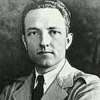Richard E. Byrd

Richard E. Byrd
Rear Admiral Richard Evelyn Byrd, Jr., USNwas an American naval officer who specialized in feats of exploration. He was a recipient of the Medal of Honor, the highest honor for valor given by the United States, and was a pioneering American aviator, polar explorer, and organizer of polar logistics. Aircraft flights in which he served as a navigator and expedition leader crossed the Atlantic Ocean, a segment of the Arctic Ocean, and a segment of the Antarctic Plateau. Byrd claimed...
NationalityAmerican
ProfessionExplorer
Date of Birth25 October 1888
CountryUnited States of America
In Winter, [the Antarctic] is perhaps the dreariest of places. Our base, Little America, lay in a bowl of ice, near the edge of the Ross Ice Barrier. The temperature fell as low as 72 degrees below zero. One could actually hear one's breath freeze.
Few men during their lifetime comes anywhere near exhausting the resources dwelling within them. There are deep wells of strength that are never used.
I paused to listen to the silence. My breath, crystallized as it passed my cheeks, drifted on a breeze gentler than a whisper. The wind vane pointed toward the South Pole. Presently the wind cups ceased their gentle turning as the cold killed the breeze. My frozen breath hung like a cloud overhead. The day was dying, the night was being born-but with great peace. Here were the imponderable processes and forces of the cosmos, harmonious and soundless. Harmony, that was it!
The human race cannot go forward without liberty. If this be correct, then all people everywhere should strive for liberty. If they achieve liberty, they will get a chance to pursue happiness and perhaps will be able to develop toward the ultimate goal of creation.
I am hopeful that Antarctica in its symbolic robe of white will shine forth as a continent of peace as nations working together there in the cause of science set an example of international cooperation.
What people think about you is not supposed to matter much, so long as you yourself know where the truth lies; but I have found out, as have others who move in and out of newspaper headlines, that on occasion it can matter a good deal. For once you enter the world of headlines you learn there is not one truth but two: the one which you know from the facts; and the one which the public, or at any rate a highly imaginative part of the public, acquires by osmosis.
If the expedition had failed, which it might well have done with all hope centered in just one plane, I should still be trying to pay back my obligations.
The human race, my intuition tells me, is not outside the cosmic process and is not an accident. It is as much a part of the universe as the trees, the mountains, the aurora, and the stars.
A man doesn't begin to attain wisdom until he recognizes he is no longer indispensable.
We men who serve science serve only a reflection in a mirror.
A hand from Washington will be stretched out and placed upon every man’s business; the eye of the federal inspector will be in every man’s counting house… The law will of necessity have Indus[tr]ial features, it will provide penalties, it will create complicated machinery. Under it, men will be hauled into courts distant from their homes. Heavy fines imposed by distant and unfamiliar tribunals will constantly menace the taxpayer. An army of federal inspectors, spies, and detectives will descend upon the state.
Below -60° cold will find the last microscopic touch of oil in an instrument and stop it dead. If there is the slightest breeze, you can hear your breath freeze as it floats away, making a sound like that of Chinese firecrackers. As does the morning dew, rime coats every exposed object. And if you work too hard and breathe too deeply, your lungs will sometimes feel as if they were on fire.
Christianity has not failed. It is simply that nations have failed to try it. There would be no war in a God-directed world.
Patience is what you need in the Antarctic. Wait-Give wind and tide a chance to change.